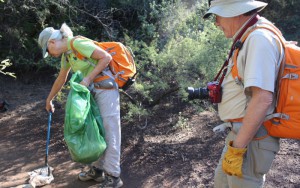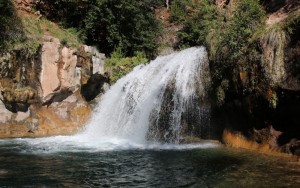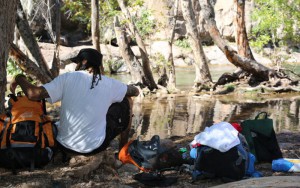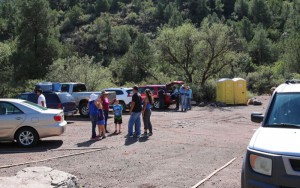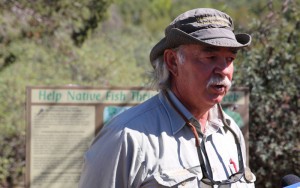- Slug: BC-CNS-Fossil Creek, 1,000
- Photos available below
- Video story in YouTube
By TY SCHOLES
Cronkite News
CAMP VERDE, Ariz. – Dennis Ly heard about the pristine swimming holes at Fossil Creek from a neighbor. The clear blue, 72-degree water was a siren song in the middle of a fiery Arizona July. Determined to check out this desert oasis, he and three friends made the two-hour drive to swim and relax, but minutes from their destination, they hit a roadblock.
“Sorry,” the ranger at the barricade told him. “We’ve reached our capacity today, there is no more room to park.” Ly was one of 43,000 people turned away from Fossil Creek this year, according to the Forest Service.
Fossil Creek is jam packed every weekend over the summer. And the crowds are having a negative impact on the delicate ecosystem. Vegetation is often flattened for impromptu parking spots, signs are tagged with graffiti and beer cans can be seen floating down the stream. Mass visitation has taken a toll on the wild and scenic river.
Next year, nature lovers with a bit of foresight won’t have to leave anything to fate. The Red Rock Ranger District of the U.S. Forest Service is working on an online reservation plan to bring order to Fossil Creek’s chaotic summer season.
The reservation plan, which has not been finalized, would allow a limited number of $10 parking passes to be reserved, ensuring an assigned spot for visitors. Rangers say they have seen more than 300 cars parked along the roads down in the canyon in years past, but the new reservation system could impose a 100 to 150 car limit.
“We want people to enjoy its beauty, but the place is just being loved to death,” said Dex Allen, a Forest Ranger who has worked in the Fossil Creek area for more than a decade.
The reservation plan is the Forest Service’s response to a recent explosion in visitation to Fossil Creek, which is 30 miles southeast of Camp Verde.
The creek saw a wave of new visitors when Arizona Public Service returned water flow to the tucked-away spot in 2005 by decommissioning the Childs-Irving Hydroelectric Facilities. The power plants stifled water flow in the creek for nearly a century, and their deconstruction created what is arguably the most scenic series of swimming holes in the state. In 2006, 20,000 people visited Fossil Creek, according the Forest Service. Thanks to news coverage, social media and word-of-mouth recommendations, 115,000 have tried to visit the area so far in 2015. Rangers said 72,000 have been allowed to enter.
Currently, Forest Service rangers regulate parking along the Camp Verde entrance to the creek. Once the area is full, rangers revert to a one-in, one-out system where newcomers must wait until other visitors leave to gain entry. Rangers at the checkpoints hand out brochures to latecomers, giving directions to other natural swimming areas within driving distance.
“In 2011, people started to just park wherever they wanted, right in front of ‘No Parking’ signs and on both sides of the road. Not only did the vegetation get destroyed, but the gridlock caused a serious safety issue. What if an ambulance needs to get down there? Forget about it,” Allen said.
Safety is the key motivation for the reservation plan. Sgt. Rodney Cronk, the search and rescue coordinator for Gila County Sheriff’s Department, said that reckless visitors are costing local government groups time and money. He said there have been 197 rescues out of Fossil Creek since May 1.
Safety hazards come in many forms in Fossil Creek, said Cronk. Search and rescue has dealt with everything from drunken tumbles and twisted ankles to severe dehydration and drownings.
“They’re going really unprepared, they don’t do any research. They come in from the wrong side, wearing flip flops and bringing a single water bottle,” Cronk said.
The “wrong side” Cronk referred to is the northeast entrance from Strawberry, which requires a 10-mile hike to access the creek. Visitors often expect a light stroll to the creek from the Strawberry entrance, only to find out there is a 1,400 ft. elevation change down a rocky path before shade or water.
Cronk said he hopes the reservation plan will cause people to be more mindful and prepared when traveling to the wild area.
Traffic and visitation are not the only aspects of Fossil Creek that the Forest Service is looking to regulate. Environmental advocacy groups petitioned the federal government to restore the riparian ecosystem when APS decommissioned the power plants. In 2009, Congress designated the spring-fed creek a “wild and scenic river,” requiring the Forest Service to formulate a plan to protect the “outstandingly remarkable” features that it boasts. These features include the water quality, travertine features, and rare species of native wildlife that inhabit the waterway.
Steve Spangle, a field supervisor for U.S Fish and Wildlife service said human visitation has had a profound influence on the ecosystem.
“People tend to leave trash and human waste, they trample banks, and cut vegetation for firewood. These impacts have a cumulative effect. Over time, the damage really adds up,” Spangle said.
The federal designation has called for a “Comprehensive River Management Plan,” and scientists will be studying the effects of human impact on Fossil Creek through the winter. The reservation system is an interim plan to help ease negative impacts while future plans are developed.
The complete management plan could include the installation of restrooms at trailheads and parking areas, a shuttle bus, reinforcing Fossil Creek bridge, or campground improvements. The plan could also forbid camping of any kind. The Forest Service is seeking public comment on the management plan, which is scheduled to be completed in 2017. Comments can be mailed to Jennifer Burns at Red Rock Ranger District, Box 20420, Sedona, AZ 86351.
Rangers expect the comments from outdoor enthusiasts to be divided.
“I’m split on it,” said Richard Schwint, a Valley resident who has been hiking the waterfall trail and cliff diving at Fossil Creek for five years. “It’s kind of a bummer ’cause it’s been free the whole time. Then again, it is kinda needed,” he said, nodding to the trash bag he packs to pick up litter along the way. “It’s a double edged sword.”
